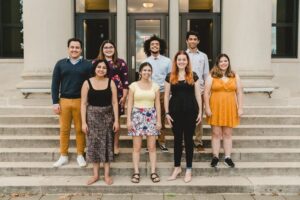The WKU Forensics Team dates back further than WKU itself. The program has seen extreme success in national forensics competitions, boasts a broad range of members and often leads students across the country to attend WKU.
Forensics is another name for a program of speech and debate. Members compete in a vast multitude of competitions, including categories of debate, individual speaking, interpretation and extemporaneous speaking.
According to the WKU Forensics Team’s website, the earliest records of competitive public speaking date back to 1885. The first official intramural oratory debate team was formed by WKU’s original institution, Southern Normal School, in 1899. WKU was founded seven years later in 1906.
Ganer Newman, the director of the WKU Forensics Team, spoke on the importance and value forensics brings to the WKU community.
“Forensics basically means our students are involved in various competitions and events with the goal to discover some truth about the human tradition and communicate that to the audience,” Newman said. “There’s lots of different categories but everyone is on the same team, and there’s lots of different events that capture aspects of public speaking.”
As the director and “head coach” of the team, Newman has helped many students not only in forensics but in their personal growth.
“What I love about what I get to do is that I get to facilitate an activity I truly believe has a positively transformational impact on student lives,” Newman said. “It gives students a lot of empowerment; it shows that the things that they do can and will improve the world. It helps students develop a global consciousness and awareness of what’s happening, a true sense of ‘what I say about this matters, someone has to listen to what I think about this problem’”.
Tess Welch, a senior on the Forensics Team and a special education major, shared her experiences after four years on the team. She strongly valued the influence that both support and varying cultures brought to the team.
“WKU has such a strong history with this debate team, it literally predates Western itself,” Welch said. “There’s strong institutional support for this team. It’s clear that part of the WKU culture of success is that the administration keeps making debate a priority; they’re proud of it.”
Forensics is more than just the national end of the year competition for many students. Welch explained the experience-based approach the team has and that the members are the focus of the team, not the competitions.
“Something about forensics is that we care about what you put into it, not about the results,” Welch said. “That’s a unique aspect, you move on and you become better as you gain more experience. The culture is unlike any other.”
Paige Allbright, another senior and communication studies major on the team, explained the ability of the forensics team to build personal connections and support other students on multiple fronts.
“My favorite part about being on the team is the community of support our team fosters,” Allbright said. “Most students on the team are not from anywhere near here, so we all act almost as chosen family and support each other wherever we can–whether that be competitively, or just in life. Our coaches also understand this, and make themselves available to support us in all aspects of life.”
Allbright also described the impact that support of the team has on both the campus community and the members involved.
“It’s highly important that WKU continue to support the Forensics Team,” Allbright said. “Our team brings an awareness to this campus that no other organization can. This team provides students not only an educational opportunity, but opens the door for conversations this university needs to have.”
Derek Collins, a 2021 WKU and Forensics Team alumnus, shared the ways that his experience on the forensics team influences his work in Washington, D.C. as a staff assistant and clerk for a subcommittee on the COVID-19 crisis.
“I would say, for example, the research that I had to do to craft my speeches and other things were very vital to the way that I do things now and operate within my job,” Collins said. “Speech opened me up to campus opportunities. Ultimately, speech taught me to think deeply about the people that are around me and ask why they think the way they think, so that we can end up providing the best benefit to society.”

